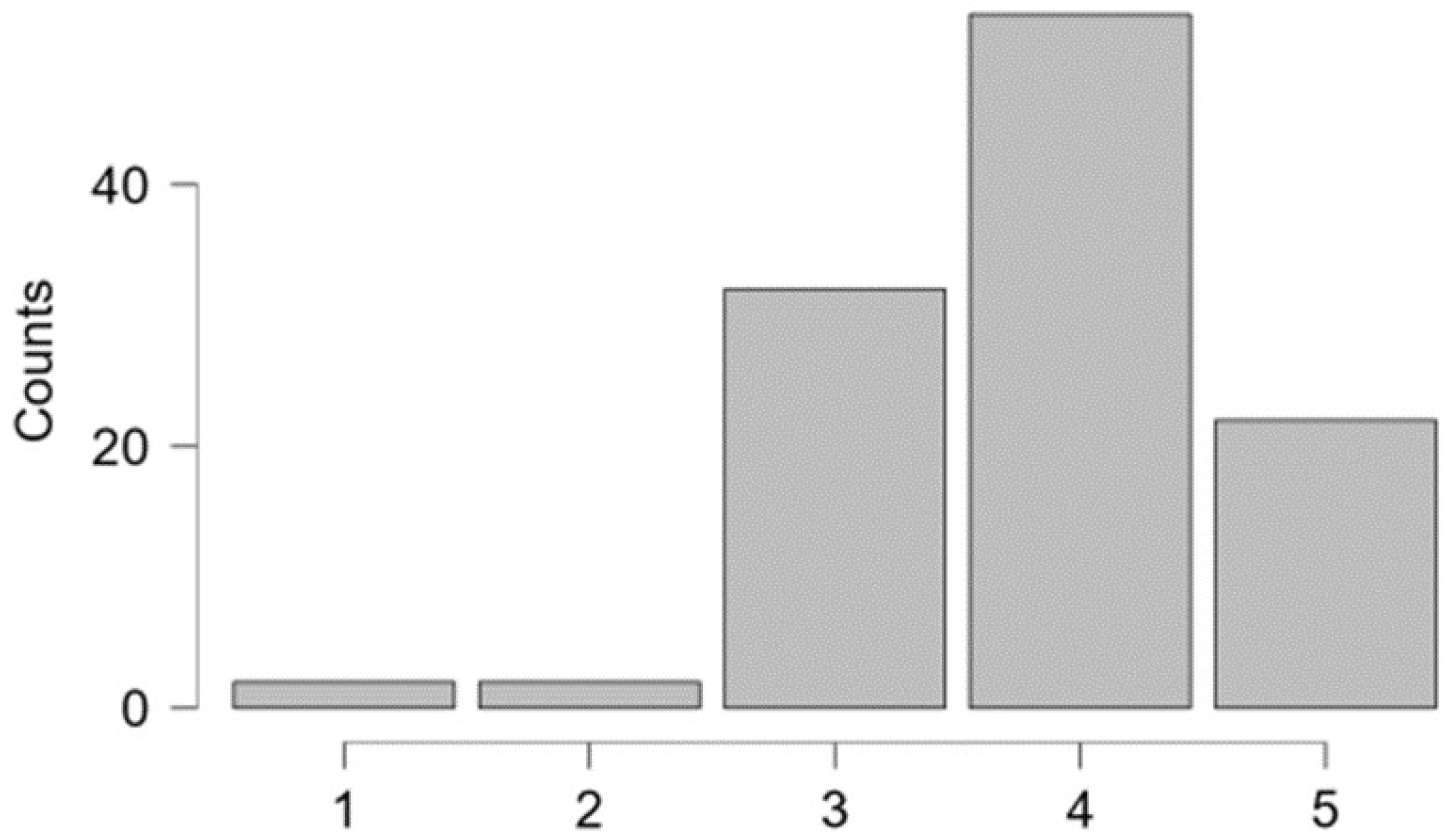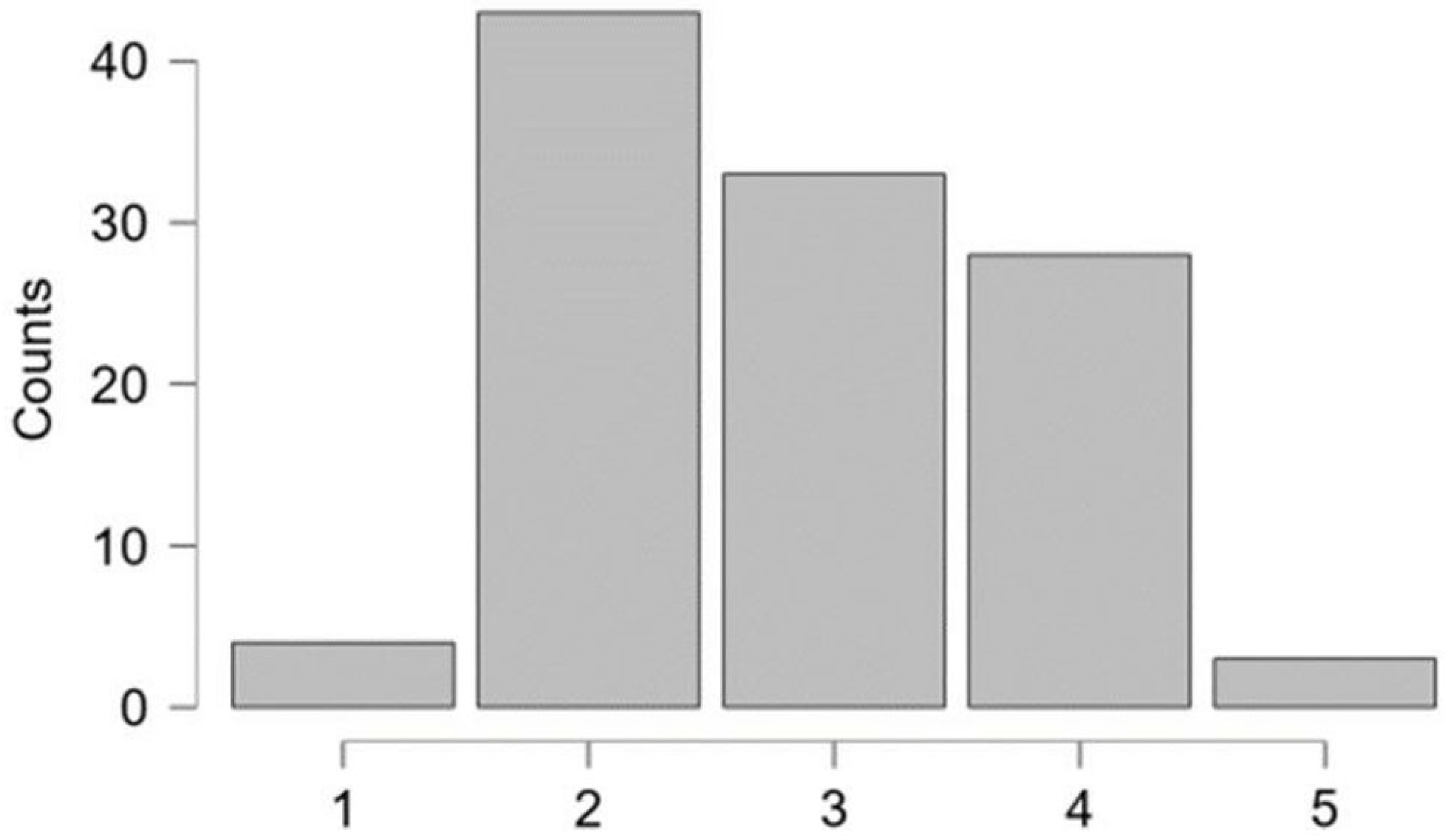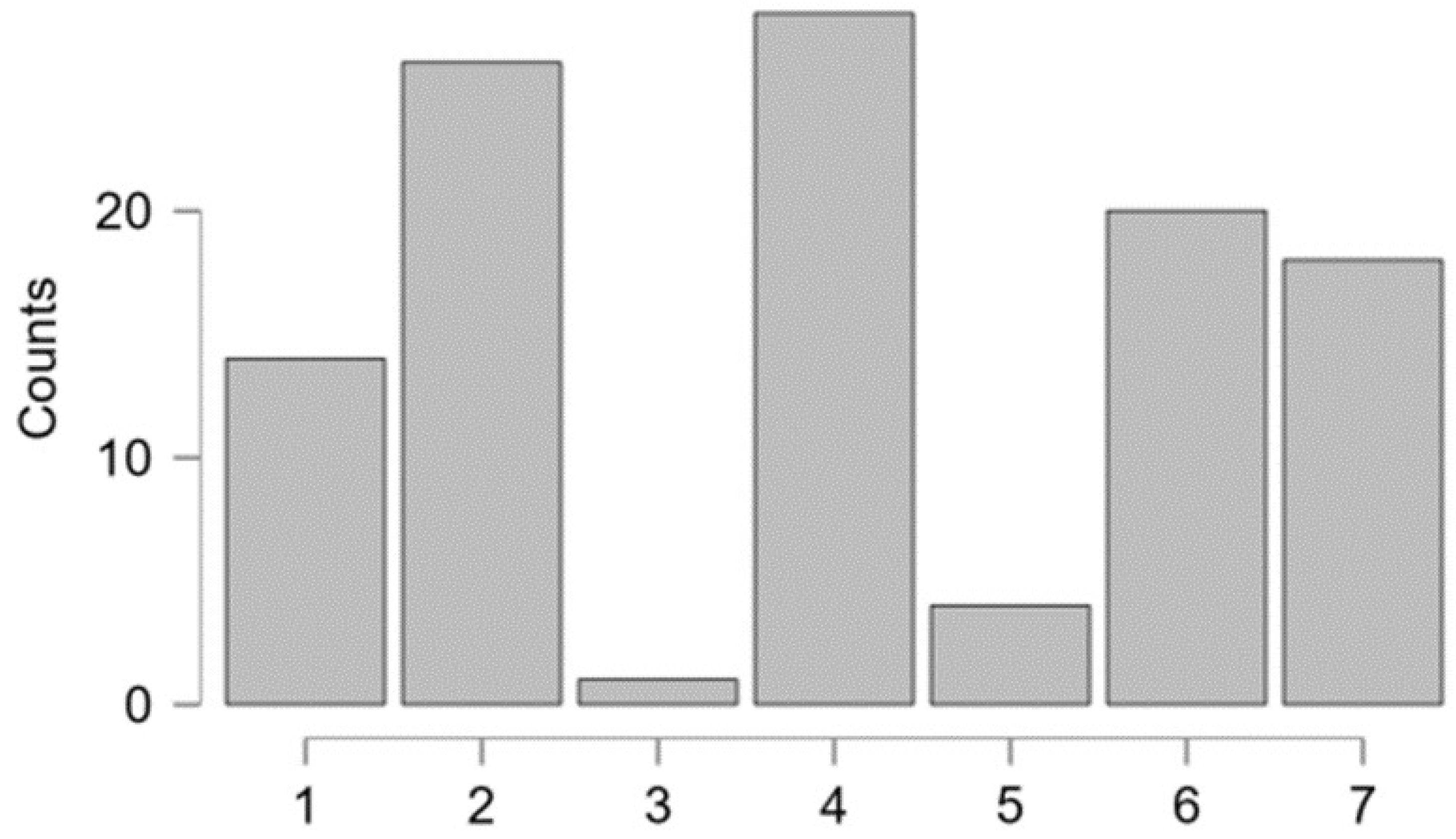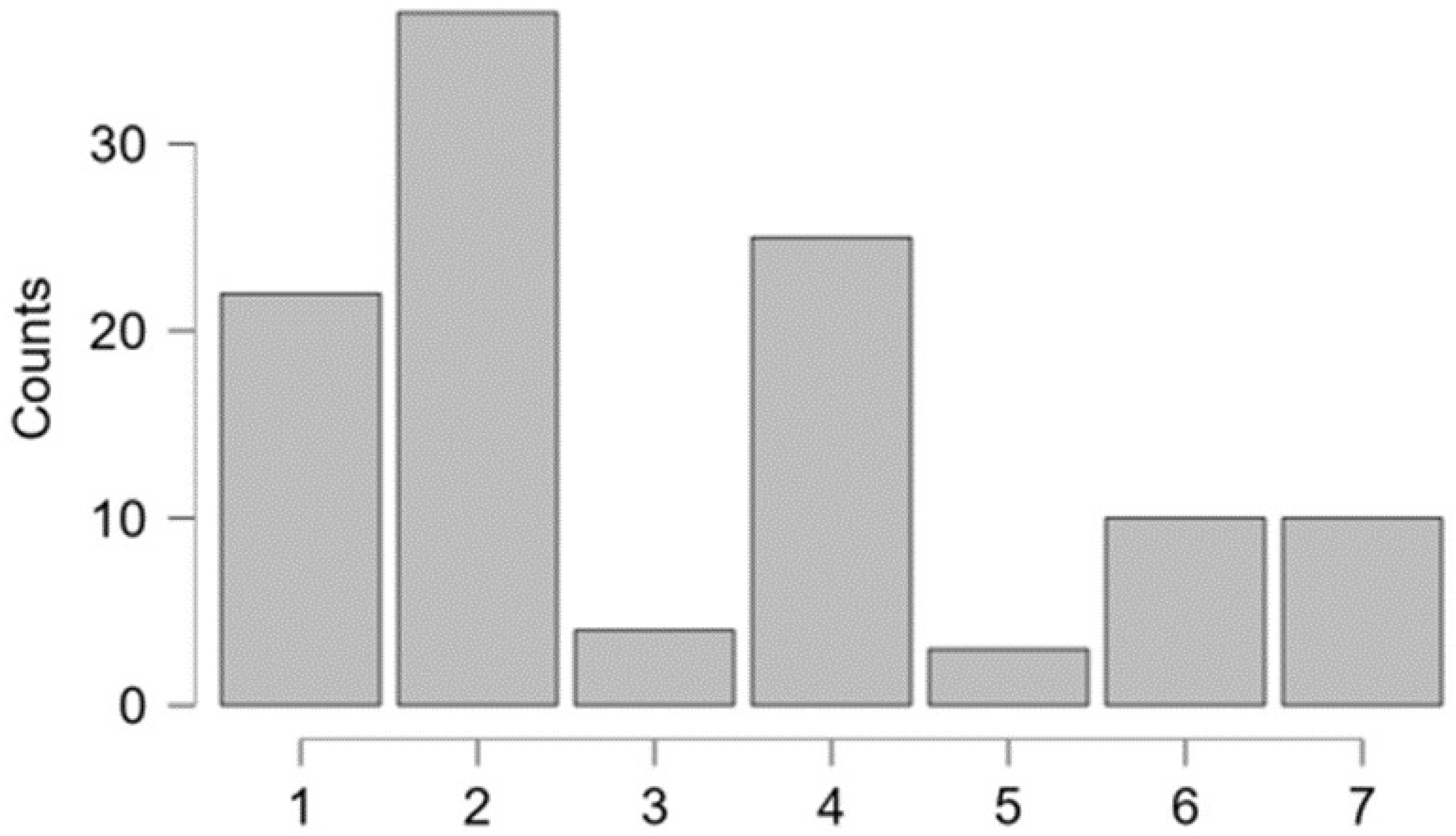Emotional Intelligence and Burnout Syndrome Among the Employees of the Local Government of the Prefecture of Serres †
Abstract
1. Introduction
2. Method
3. Results
| “I am an Optimistic Person.” | ||||
|---|---|---|---|---|
| I Am an Optimistic Person | Frequency | Percent | Valid Percent | Cumulative Percent |
| 1 | 2 | 1.802 | 1.802 | 1.802 |
| 2 | 2 | 1.802 | 1.802 | 3.604 |
| 3 | 32 | 28.829 | 28.829 | 32.432 |
| 4 | 53 | 47.748 | 47.748 | 80.180 |
| 5 | 22 | 19.820 | 19.820 | 100.000 |
| Missing | 0 | 0.000 | ||
| Total | 111 | 100.000 | ||
| “I Usually Struggle with Controlling My Emotions.” | ||||
|---|---|---|---|---|
| “I Usually Struggle with Controlling My Emotions.” | Frequency | Percent | Valid Percent | Cumulative Percent |
| 1 | 4 | 3.604 | 3.604 | 3.604 |
| 2 | 43 | 38.739 | 38.739 | 42.342 |
| 3 | 33 | 29.730 | 29.730 | 32.432 |
| 4 | 28 | 25.225 | 25.225 | 97.297 |
| 5 | 3 | 2.703 | 2.703 | 100.000 |
| Missing | 0 | 0.000 | ||
| Total | 111 | 100.000 | ||
| “I Feel Mentally Exhausted from My Work.” | ||||
|---|---|---|---|---|
| “I Feel Mentally Exhausted from My Work.” | Frequency | Percent | Valid Percent | Cumulative Percent |
| 1 | 14 | 12.612 | 12.612 | 12.613 |
| 2 | 26 | 23.423 | 23.423 | 36.036 |
| 3 | 1 | 0.901 | 0.901 | 36.937 |
| 4 | 28 | 25.225 | 25.225 | 62.162 |
| 5 | 4 | 3.604 | 3.604 | 65.766 |
| 6 | 20 | 18.018 | 18.018 | 83.794 |
| 7 | 18 | 16.216 | 16.216 | 100.000 |
| Missing | 0 | 0.000 | ||
| Total | 111 | 100.000 | ||
| “I Feel Like I Have Reached the Limits of My Mental Endurance.” | ||||
|---|---|---|---|---|
| “I Feel Like I Have Reached the Limits of My Mental Endurance.” | Frequency | Percent | Valid Percent | Cumulative Percent |
| 1 | 22 | 19.820 | 19.820 | 19.820 |
| 2 | 37 | 33.333 | 33.333 | 53.153 |
| 3 | 4 | 3.604 | 3.604 | 56.757 |
| 4 | 25 | 22.523 | 22.523 | 79.279 |
| 5 | 3 | 2.703 | 2.703 | 81.982 |
| 6 | 10 | 9.009 | 9.009 | 90.997 |
| 7 | 10 | 9.009 | 9.009 | 100.000 |
| Missing | 0 | 0.000 | ||
| Total | 111 | 100.000 | ||
4. Conclusions
Author Contributions
Funding
Institutional Review Board Statement
Informed Consent Statement
Data Availability Statement
Acknowledgments
Conflicts of Interest
References
- Antoniou, A.S. Burnout: Syndrome of Professional Exhaustion; University Studio Press: Thessaloniki, Greece, 2008. [Google Scholar]
- Goleman, D. Emotional Intelligence in the Workplace; Greek Letters: Athens, Greece, 1999. [Google Scholar]
- Mayer, J.D.; Salovey, P. The intelligence of emotional intelligence. Intelligence 1993, 17, 433–442. [Google Scholar] [CrossRef]
- Goleman, D. Emotional Intelligence: Why It Can Matter More Than IQ; Greek Letters: Athens, Greece, 1998. [Google Scholar]
- Cherniss, C. Staff Burnout: Job Stress in the Human Services; Sage: London, UK, 1980. [Google Scholar]
- Bar-On, R. Emotional and Social Intelligence: Insights from the Emotional Quotient Inventory; Jossey-Bass: San Francisco, CA, USA, 2000. [Google Scholar]
- Kafetsios, K. Emotional Intelligence Skills: Theory and Applications in the Workplace Environment. Greek Acad. Bus. Adm. 2003, 2, 16–25. [Google Scholar]
- Mayer, J.D.; Salovey, P.; Caruso, D.R. TARGET ARTICLES: “Emotional Intelligence: Theory, Findings, and Implications”. Psychol. Inq. 2004, 15, 197–215. [Google Scholar] [CrossRef]
- Cherniss, C. (Ed.) The Emotionally Intelligent Workplace: How to Select for, Measure, and Improve Emotional Intelligence in Individuals, Groups, and Organizations; Jossey-Bass: San Francisco, CA, USA, 2001. [Google Scholar]
- Maniatis, G. Philosophy in Europe: A Brief Introduction to Ancient Greek Philosophy; HOU: Patras, Greece, 2008; p. 32. [Google Scholar]
- Cherniss, C. Professional Burnout in the Human Service Organizations; Praeger: New York, NY, USA, 1980. [Google Scholar]
- Ashkanasy, N.M.; Daus, C.S. Emotional intelligence in the workplace. In The Wiley Encyclopedia of Personality and Individual Differences: Clinical, Applied, and Cross-Cultural Research; Wiley: Hoboken, NJ, USA, 2020. [Google Scholar]
- Bar-On, R. BarOn Emotional Quotient Inventory; Multi-Health Systems: Toronto, ON, Canada, 1997. [Google Scholar]
- Davis, M.H. Empathy: A Social-Psychological Approach; Westview: Boulder, CO, USA, 1996. [Google Scholar]
- Edelwich, J.; Brodsky, A. Burrn-Out: Stages of Disillusionment in the Helping Professions; Human Services Press: New York, NY, USA, 1980. [Google Scholar]
- Farber, B.A. Understanding and Treating Burnout in a Changing Culture. J. Clin. Psychol. 2000, 56, 589–594. [Google Scholar] [CrossRef]
- Sanchez-Gomez, M. In Pursuit of Work Performance: Testing the Contribution of Emotional Intelligence and Burnout. Int. J. Environ. Res. Public Health 2020, 17, 5373. [Google Scholar] [CrossRef] [PubMed]
- Leiter, P.; Maslach, C. Preventing Burnout and Building Engagement: A Complete Program for Organizational Renewal; Jossey-Bass: San Francisco, CA, USA, 2000. [Google Scholar]
- Goleman, D.; Boyatzis, R.; Kee, A. The New Leader, The Power of Emotional Intelligence in Organizational Management; Greek Letters: Athens, Greece, 2002. [Google Scholar]




| Characteristics | N% |
|---|---|
| Age | |
| <30 | 18 (16.21) |
| 31–40 | 18 (16.21) |
| 41–50 | 51 (45.94) |
| 51> | 24 (21.62) |
| Gender | |
| Men | 30 (27.02) |
| Women | 81 (72.97) |
| Educational level | |
| High school degree | 19 (17.12) |
| Degree AEI | 25 (22.52) |
| Degree AEI | 24 (21.62) |
| Postgraduate degree | 38 (34.23) |
| Doctoral title | 1 (0.9) |
| Other | 4 (3.6) |
| Work experience | |
| 0–5 | 33 (29.73) |
| 6–10 | 12 (10.81) |
| 11–20 | 36 (32.73) |
| 21> | 30 (27.02) |
| Marital status | |
| Single | 34 (30.63) |
| Married | 69 (62.16) |
| Divorced | 7 (6.31) |
| Widowed | 1 (0.9) |
Disclaimer/Publisher’s Note: The statements, opinions and data contained in all publications are solely those of the individual author(s) and contributor(s) and not of MDPI and/or the editor(s). MDPI and/or the editor(s) disclaim responsibility for any injury to people or property resulting from any ideas, methods, instructions or products referred to in the content. |
© 2025 by the authors. Licensee MDPI, Basel, Switzerland. This article is an open access article distributed under the terms and conditions of the Creative Commons Attribution (CC BY) license (https://creativecommons.org/licenses/by/4.0/).
Share and Cite
Nalbanti, D.; Pascaloudis, D.; Trentsiou, G. Emotional Intelligence and Burnout Syndrome Among the Employees of the Local Government of the Prefecture of Serres. Proceedings 2024, 111, 24. https://doi.org/10.3390/proceedings2024111024
Nalbanti D, Pascaloudis D, Trentsiou G. Emotional Intelligence and Burnout Syndrome Among the Employees of the Local Government of the Prefecture of Serres. Proceedings. 2024; 111(1):24. https://doi.org/10.3390/proceedings2024111024
Chicago/Turabian StyleNalbanti, Despoina, Dimitris Pascaloudis, and Georgia Trentsiou. 2024. "Emotional Intelligence and Burnout Syndrome Among the Employees of the Local Government of the Prefecture of Serres" Proceedings 111, no. 1: 24. https://doi.org/10.3390/proceedings2024111024
APA StyleNalbanti, D., Pascaloudis, D., & Trentsiou, G. (2024). Emotional Intelligence and Burnout Syndrome Among the Employees of the Local Government of the Prefecture of Serres. Proceedings, 111(1), 24. https://doi.org/10.3390/proceedings2024111024






